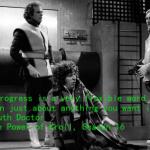Lately there has been an incredible amount of discussion about the liberal arts, liberal education, small majors, the humanities, and countless other aspects of education. I kept noting links to articles that I thought were worth sharing, but it took being reminded of the clip below from Star Trek: The Next Generation to prompt me into action. No less an authority than Capt. Picard himself speaks here about the value of being liberally educated!
[I]n a world scarred by violence, instigated polarization and managed parochialism, these educational practices of consideration, critique and empathy are beacons of hope. Seeing the world from someone else’s point of view is no simple task, but you get much better at it when you practice. That’s what we are doing much of the time on our campuses.
When we foster intellectual diversity, we are practicing learning from others different from ourselves. Sure, sometimes people retreat to the “bubbles” of their own tribe, whether they call that safety, tradition or prejudice. But much of the time, our teachers, students and staff encounter difference and try to figure out how to learn from it, sometimes finding out that commonalities are more significant than the distinctions that first impressed them.
Such encounters are woven into the fabric of our everyday educational practices. These days, they are hopeful alternatives to the normalization of violence and the pollution of our public sphere. Now, more than ever, we must work to protect them.
Much of the discussion relates to the practical workplace value of certain majors and certain courses, or of the liberal arts in general. But it is important to reflect on big questions, at least why one is pursuing one’s professional path if not much bigger questions than that. The crucial point, which Picard speaks to, is that it is not an either/or question. Study of philosophy, religion, ethics, art, and so on all enhance one’s capacity to do more than simply deal with mechanical aspects of piloting a spacecraft. It is important to be prepared to utilize those piloting skills to save lives, for instance. If one is an engineer without thinking about ethics, one can do significant harm. Plus, if one hasn’t learned how to learn, then when shuttlecraft pilot suddenly becomes a job, many will find it hard if not impossible to adapt. Being able to fact-check will be increasingly relevant in every career, but also for citizenship, as will simply being able to identify what kind of source one has found and what it should or should not be used for. Being aware of the limits of our reasoning abilities is a key to using such skills wisely and appropriately. Appreciating the value of as well as the differences between the humanities and sciences seems to be of ongoing crucial importance.
See also:
Measuring the Evolution Gap between the Humanities and the Sciences
Why postmodernism and science can’t stand each other
https://workingnation.com/making-the-liberal-arts-education-relevant-again/
Employers want English majors more than business majors
https://source.wustl.edu/2018/12/how-a-liberal-arts-education-prepared-one-grad-for-medicine/
Student attitudes to free speech, and the need to preserve intellectual diversity and free inquiry in higher ed, were also popular topics in recent months.
Inside Higher Ed featured a piece on the need to teach students that certain things are true. They also featured three different articles responding to the suggestion that it is time to get rid of college majors. The Connection also contributed to the conversation.
Illustrations from trucker shortages and an expensive restaurant for higher education.













